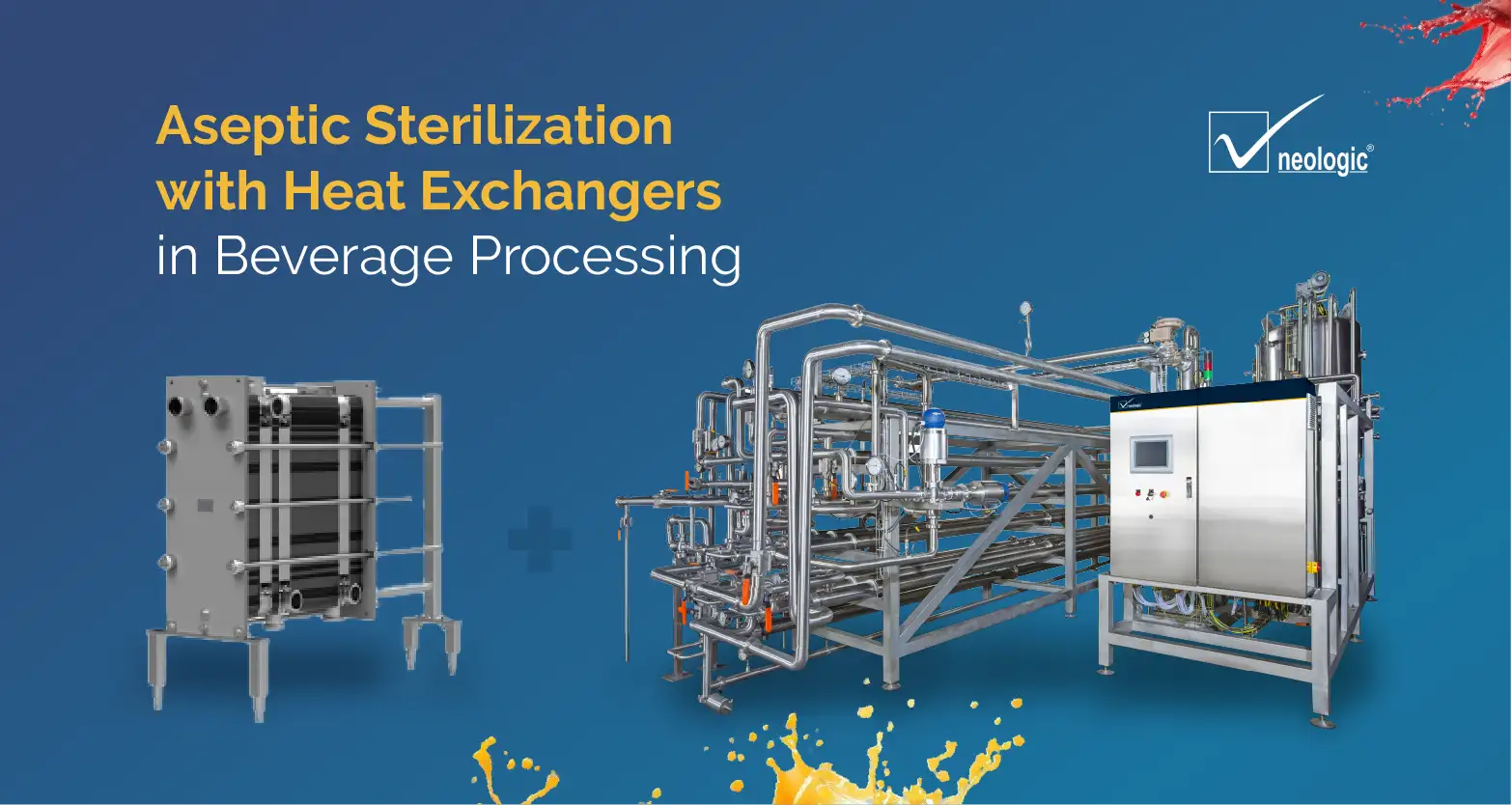
Aseptic Sterilization with Heat Exchangers in Beverage Processing
Sterilization of a beverage is one of the most important processes in beverage processing, ensuring product safety and quality is important. Aseptic sterilization — a process that eliminates harmful microorganisms to ensure the safety, stability, and shelf life of beverages.
Heat exchangers play a pivotal role in this sterilization process. They efficiently transfer heat to bring beverages to the required temperatures while preserving their nutritional and sensory qualities. With this article, you will understand the different heat exchangers and how they benefit the beverage processing process.
Role of Aseptic Sterilization in Beverage Processing
Aseptic sterilization involves heating beverages to high temperatures to destroy microorganisms like bacteria, viruses, yeasts, and molds. However, this must be done without compromising the flavor, color, or nutritional value of the beverage. Properly sterilized beverages can be stored for long periods without refrigeration, making aseptic processing crucial for shelf-stable products such as juices, dairy products, and flavored waters.
Aseptic Sterilization Process
Both PHE and THE are integral to the aseptic sterilization process. Here's how the process generally works:
- Preheating: The beverage is preheated to a lower temperature to reduce the thermal shock on the equipment and product.
- Sterilization: The beverage is rapidly heated to a high temperature (usually above 95°C till 105°C) for a short duration, effectively killing microorganisms. This is where the heat exchanger's efficiency comes into play.
- Cooling: After sterilization, the beverage is quickly cooled to preserve its sensory qualities, such as taste and texture, and ensure that it can be safely packaged without refrigeration.
- Packaging: The sterilized beverage is then filled into sterilized containers in an aseptic environment to prevent recontamination.
Purpose of Heat Exchanger in Temperature Regulation
The purpose of heat exchangers is not limited to just heating the products they also help cool down the beverage. During the processing, to meet the requirements of products with different viscosity, heat exchangers use innovative designs to exchange heat and maximize efficiency. They contain the exact combination of temperature and holding time for:
- Ultra-pasteurization temperature sterilization
- Beverage and energy drink pasteurization
The choice of heat exchanger plays a critical role in this process, as it directly impacts the efficiency of heat transfer, energy consumption, and the overall quality of the final product.
Fouling in heat exchanger tubes may substantially decrease heat transfer efficiency, resulting in higher energy consumption and more frequent maintenance. The high shear force and turbulence in their design reduce the likelihood of biofilm buildup while ensuring efficient heat transfer. The temperature difference between the coolant and hot fluid is critical for efficient heat transmission.
Types of Heat Exchangers
Plate Heat Exchanger (PHE)
A Plate Heat Exchanger (PHE) is a widely used technology in beverage processing, particularly for products like juices (cloudy/clear) and soft drinks (including carbonated soft drinks). This type of heat exchanger consists of a series of thin, corrugated plates stacked together. Fluids flow between the plates, allowing heat to be transferred between them efficiently.
Key Benefits of PHE
- High Efficiency: The corrugated design of the plates ensures maximum surface area for heat transfer, making PHEs highly efficient. They can quickly bring beverages to the desired sterilization temperature.
- Compact Design: Due to their efficient heat transfer capabilities, PHEs are compact and space-saving, making them ideal for facilities with limited space.
- Easy Maintenance: The modular design allows for easy disassembly, making cleaning and maintenance simple, and reducing downtime in production.
- Flexibility: PHEs offer flexibility in terms of capacity. They can be easily modified or expanded to meet the changing needs of beverage production, making them a versatile choice.
PHEs are often used to pasteurize juices at high temperatures for a short duration (HTST) to ensure microbial safety while preserving the beverage’s flavor and color.
Tubular Heat Exchanger (THE)
A Tubular Heat Exchanger (THE) is another highly effective solution, particularly suited for beverages with higher viscosities or particulate matter, such as smoothies or pulpy juices. This heat exchanger consists of a series of tubes, through which the beverage flows while being heated by an external medium, ensuring uniform temperature distribution.
Key Benefits of THE
- Ideal for Viscous Products: Tubular heat exchangers are better suited for beverages with higher viscosity or particles, as the tubular design reduces the risk of blockages and maintains smooth product flow.
- Durability: THEs are known for their robust construction and long operational life, making them suitable for demanding production environments.
- Efficient Sterilization: The design of THE allows for effective heat transfer without compromising the structural integrity of beverages with pulp or fibers, ensuring both safety and quality.
- Low Risk of Cross-Contamination: THE systems are typically easier to clean, reducing the risk of contamination during production.
The design of THE ensures that products with pulp or particulate matter are processed efficiently without damaging the structure of the beverage. THEs are ideal for sterilizing thicker, more viscous products like dairy-based beverages, ensuring consistent heating and quality control.
Plate Heat Exchangers and Tubular Heat Exchangers meet the industry’s rigorous demands for product hygiene by eliminating the risk of cross-contamination. The process of transferring heat through these exchangers is essential for maintaining efficiency and safety in various applications.
Choosing the Right Heat Exchanger
The choice between a Plate Heat Exchanger and a Tubular Heat Exchanger depends on the specific requirements of the beverage being processed. For thinner liquids like milk and juice, the PHE offers excellent efficiency and flexibility, while for thicker, more complex beverages, the THE provides the durability and performance needed to maintain product integrity.
At Neologic Engineers, we offer tailored solutions that ensure the highest standards of aseptic sterilization, helping you achieve both product safety and quality. By using state-of-the-art heat exchanger technology, we help beverage manufacturers optimize their production processes, reduce energy consumption, and meet stringent industry regulations.